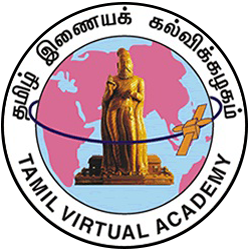Primary tabs
- P10311 Contemporary Tamil Poetry - An Introduction
This lesson talks about contemporary Tamil poetry. It draws a comparison between classical and modern Tamil poetry. It traces the origin and growth of modern Tamil poetry and also discusses the precursors of modern Tamil poetry. It offers an insight into the form, techniques, themes and types of modern Tamil Poetry.Tamil poetry is broadly divided into two types: classical ie., (Marabu Kavithai) and modern ie., (Puthu Kavithai). Poetry in the classical tradition closely follows the "Yappilakkanam", which outlines the rules governing versification. Poems from the Sangam literature and Bakthi literature are examples of classical Tamil poetry. Until the beginning of the 20th century poetry was written in the classical tradition. Even in the early years of the 20th century several poets followed the classical tradition. Barathiyaar, Namakkal Kavingar, Barathidasan, Vaanidasan and Pattukottai Kalyanasundaram are some noted exponents of Tamil classical poetry. Barathiyaar who lived during the height of the freedom struggle used his poems as a means of inspiring patriotism among the people. Barathidasan's poems written in the classical tradition, celebrate the greatness of Tamil culture and language. Kannadasan and Pattukottai Kalyanasundaram wrote several songs in the classical tradition for the movies. Kannadasan's poems are highly philosophical and explore the myriad facets of human life. Pattukottai Kalyanasundaram captured the plight of the working class in his poems.
Modern Tamil poetry ie., (Puthu Kavithai) is also known as Vasana Kavithai ie., (poetry which is prose like and conversational in tone), Yappilla Kavithai ie., (poetry which does not follow the rules in the "Yappilakkanam") and Kattiladangaa Kavithai ie., (Free Verse). Though Barathiyaar wrote in the classical tradition he is also hailed as the earliest exponent of free verse. After Barathiyaar, Na. Pichamurthy contributed greatly to the growth of modern Tamil poetry. Advancement in science and technology and the impact of western literature paved way for the growth of modern Tamil poetry. It must also be mentioned that journals played a major role in encouraging poets who experimented with form. The growth of modern Tamil poetry is divided into 3 periods: viz Manikodi Kaalam, Ezhuthu Kaalam and Vaanambadi Kaalam. The major poets of each of these periods and the themes underlying their poems are discussed in detail in this lesson. Modern Tamil poetry is largely experimental and poets are constantly exploring new possibilities with regard to the use of images, symbols and even in the arrangement of letters and lines.


